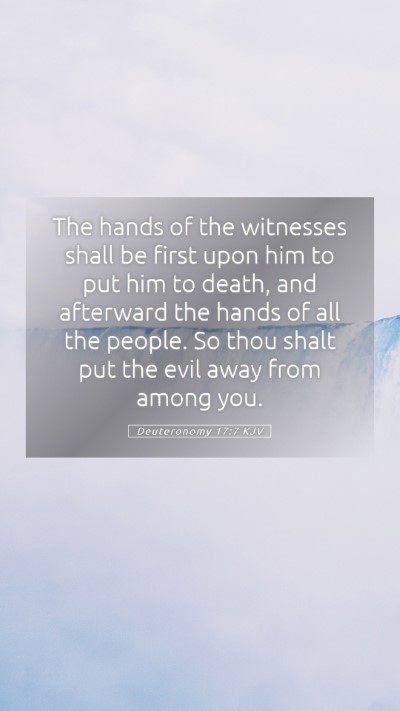Understanding Deuteronomy 17:7
Bible Verse: Deuteronomy 17:7 - "The hands of the witnesses shall be first upon him to put him to death, and afterward the hands of all the people. So thou shalt put the evil away from among you."
Meaning and Explanation
The verse Deuteronomy 17:7 deals with the serious implications of false witness and capital punishment within the community of Israel. This instruction emphasizes the gravity of bearing false witness, particularly in judicial matters.
Bible Verse Meanings
-
Public Accountability: Both Matthew Henry and Adam Clarke highlight the principle of communal responsibility in maintaining justice. The witnesses in legal cases bore the initial responsibility for the execution, which stresses their accountability and the seriousness of their testimony.
-
Deterrent Against False Witness: Albert Barnes interprets the verse as a deterrent against false testimony. The severe consequence of having to execute the punishment acted as a safeguard against untrue accusations in a society striving for justice.
Bible Verse Interpretations
The interpretation of this verse varies but centers around the themes of justice, community integrity, and the prevention of evil. The directive indicates not just punitive measures but intended moral safeguards for the community.
Insights from Commentaries
-
Matthew Henry: He emphasizes that the law was designed not only for societal governance but also to promote moral behavior. The principle behind witnesses participating in the execution underscores a communal obligation to uphold righteousness.
-
Albert Barnes: Barnes discusses how the first-hand involvement of witnesses serves as a reminder of the serious burden and consequences associated with providing false testimony, thereby fostering careful consideration before speaking.
-
Adam Clarke: Clarke delves into the historical context, explaining that in ancient Israel, this law aimed to purify the society from evil by ceremoniously removing those who would cause harm through wickedness.
Application in Bible Study
This verse serves as a fundamental teaching point in Bible study groups for understanding how the law applied to community life in ancient Israel and how it can inform contemporary discussions on justice and moral accountability.
How to Interpret Bible Verses
When studying this verse, consider historical context, the culture of ancient Israel, and the broader theological implications regarding sin, justice, and communal responsibility.
Related Bible Cross References
- Exodus 20:16 - "You shall not bear false witness against your neighbor."
- Numbers 35:30 - "Whoever kills a person, the murderer shall be put to death on the evidence of witnesses."
- Deuteronomy 19:15 - "A single witness shall not suffice to convict a person of any crime or wrongdoing."
Final Thoughts
Understanding Deuteronomy 17:7 requires insight into the importance of justice within scripture. The communal aspect of enforcing the law and the serious implications of testimony are vital for grasping the significance of this verse in the context of Biblical teachings.
Keywords Used: Bible verse meanings, Bible verse interpretations, Bible verse commentary, understanding Scripture.


